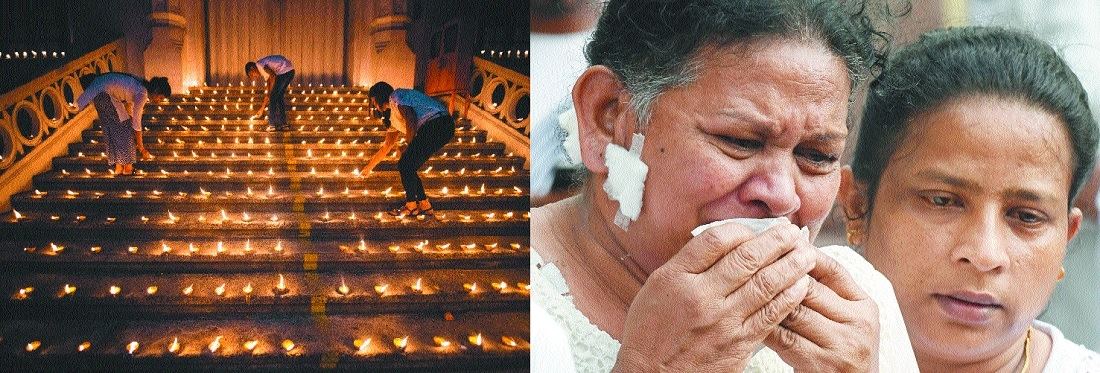Sri Lankan attacks: An example of global violence and terrorism
| Date :05-May-2019 |

By Anshuman Bhargava.
Never in the history of humanity did we need so much unity of the humanitarian forces as now. And if we don’t realise the humanitarian crisis and act smart today, the world will be left in tatters in the near future.
Sri Lankan political factions and leaders must stand united and help in the free, fair and efficient probe so that such possible attacks could be thwarted in future. Though attacks of this kind happen throughout the world these days, it is clear that Sri Lanka was unprepared and having a relative calm of the last five-six years had left it a bit relaxed and unsuspecting of an attack of such kind, contemplates ‘The Hitavada’ State Editor of MP Editions Anshuman Bhargava.

AFTER the bombings of churches and luxury hotels that killed over 257 people in Sri Lanka, the Islamic State (IS) has claimed responsibility for the atrocity. It was not unexpected. The bombings – multiple suicide attacks designed to cause mass casualties among Christian worshippers on Easter Sunday and among tourists too – had all the hallmarks of an IS attack. The group needs to prove its capability and relevance after suffering defeat in its core heartland in Syria and Iraq. It still commands support among a network of sympathisers across the Islamic world. It had the motives and the means.
Also, the local suspects named repeatedly by Sri Lankan officials do not seem convincing candidates as the sole perpetrators. They belong to a small, disorganised group, National Towheed Jamaat (NTJ), which has no history of violence of such deep implications and scale. Investigations are now showing that several of its members were among the suicide bombers. Its leader, a village cleric with a reputation for extremist rhetoric, may have been too. It is believed now as all the pieces are being collected, that the weak but motivated local group was “upgraded” by a major, experienced organisation through the provision of logistical assistance, tactical advice and possibly training.
The major organisation then deployed this newly capable outfit on a project that would fit its own strategic ends. This “sub-contracting plus” model, as one official called it, has been seen before in South Asia and elsewhere. A bloody 2016 attack in Bangladesh on a bakery patronised by westerners is one example. A double bombing of Christian worshippers in the Philippines in January is another. The alleged leader of the NTJ reportedly fled to the Maldives, which has become a hub of Islamist activism in recent years, to escape the security forces’ attention in Sri Lanka.
The possibility is high that someone from among this shadow world of travelling extremists, all connected through encrypted social media channels and some with battlefield experience, could be the “connector” that linked the amateurish Sri Lankans with those overseas who could give them the capability and confidence to commit the mass murder. Sri Lanka’s politics are a bitter zero-sum battle for influence and power. The Government is deeply divided and the security establishment is highly politicised. All actors seek to avoid blame, and for many, the priority is to direct attention away from what were clearly major failings of both security process and policy.
This is a poor environment for a difficult and delicate investigation at a time of deep grief and national trauma. Sri Lankan political factions and leaders must stand united and help in the free, fair and efficient probe so that such possible attacks could be thwarted in future. Though attacks of this kind happen throughout the world these days, it is clear that Sri Lanka was unprepared and having a relative calm of the last five-six years had left it a bit relaxed and unsuspecting of an attack of such kind. Given the global situation of violence and terrorism and the movement of its people to certain countries, the administration should have kept better track and aligned its security paraphernalia accordingly to meet exigent needs suitably. In the current world scenario, it is unforgivable to admit lapses. A calibrated attack of such kind needs a lot of precise coordination between members both within the country and outside and that too over quite a considerable period of time.
How that could be done without the Intelligence and security agencies getting a whiff of it, is surprising. Sri Lanka is a small country with a small population. It is not easy there to remain so hideous for months that no one could detect the suspicious activities of the members who perpetrated the crime. Either, the bombers were exceptionally efficient and talented or there is some insider who helped them. If both of these are invalid premises, then the security agencies must be shamed for their lapse. India sent Lanka Intelligence input quite some time back that a terror attack could be in the offing. Even then it sat ducks and could not do much to stop the series of attacks that rocked the island nation. Had it taken the warning seriously, it could have pepped up security measures to minimise the chances of such a major coordinated attack. Perhaps this is the first such major disturbance caused by a group in Sri Lanka from the days of the LTTE imbroglio.
This has also established once again that the IS is still far from being dead and it still holds the power to cause such massive mayhem and bloodshed if we are not on our guard. The Sri Lankan episode is an experience for other countries too which all need to up their internal security arrangements. With its loss of the Middle East, IS will look for new grounds for survival and relevance and can make the vulnerable nations their prey base. They will continually try to garner and influence new recruits and youngsters to bolster their activities and for this, they will need to build their networks inside countries, with local people. Thus better the internal mechanisms countries build, better they will be able to prevent the chances of a big strike. Simultaneously, it is also required of nations of the world to unite and put up joint resistance to the ill motives of IS and other terror groups by sharing Intelligence and technology. The war against terrorism is a joint responsibility of all civilised and democratic forces and they must bury their personal interests for the larger humanitarian cause. Terrorism spares no one, and people of all countries, religions and beliefs suffer its atrocities alike. Today there is nothing like their terrorism or terrorists of that or this country.
Terrorism is today a global reality that spans political and geographical boundaries. It is not just a battle of arms— it is an ideological battle too – the battle to establish sanity over bigotry, reason over religious parochialism and human progressiveness over regressive machinations. It is an effort to dislodge the attempt of a group to uphold a certain religious belief in its most uninitiated and inchoate form. To counter its influence, it is important to build a stronger narrative around human unity, camaraderie, love, peace, harmony and progress. The forces of goodness have to trump the advances of evil. That’s the way to go, that’s the way the world has progressed, and for that, we have to unite. Never in the history of humanity did we need so much unity of the humanitarian forces as now. And if we don’t realise the humanitarian crisis and act smart today, the world will be left in tatters in the near future.